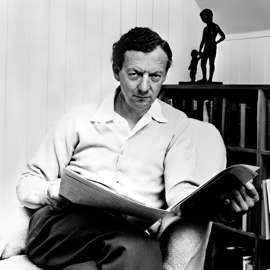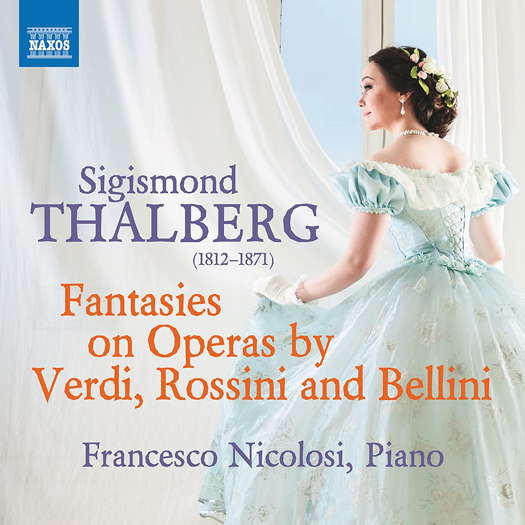 SPONSORED: Ensemble. Last Gasp of Boyhood. Roderic Dunnett investigates Jubilee Opera's A Time There Was for the Benjamin Britten centenary.
SPONSORED: Ensemble. Last Gasp of Boyhood. Roderic Dunnett investigates Jubilee Opera's A Time There Was for the Benjamin Britten centenary.
All sponsored features >>
 UPDATES: There's a new feature every day at Classical Music Daily. Read about the various ways we can keep in touch with you about what's happening here.
UPDATES: There's a new feature every day at Classical Music Daily. Read about the various ways we can keep in touch with you about what's happening here.
 DISCUSSION: What is a work? John Dante Prevedini leads a discussion about The performing artist as co-creator, including contributions from Halida Dinova, Yekaterina Lebedeva, Béla Hartmann, David Arditti and Stephen Francis Vasta.
DISCUSSION: What is a work? John Dante Prevedini leads a discussion about The performing artist as co-creator, including contributions from Halida Dinova, Yekaterina Lebedeva, Béla Hartmann, David Arditti and Stephen Francis Vasta.

Delicately Sensitive Performances
Operatic fantasies by Sigismond Thalberg, strongly recommended by GERALD FENECH
'... characteristically intense and warm ...'
Some mystery surrounds the birth and parentage of Sigismond Thalberg, one of the nineteenth century's greatest piano virtuosi. Born on 8 January 1812, Thalberg was popularly supposed to have been the illegitimate son of Count Moritz Dietrichstein and the Baroness Von Wetzlar. His birth certificate, however, provides him with different and relatively legitimate parentage, the son of a Frankfurt citizen, Joseph Thalberg. As a young boy, Sigismond went to study in Vienna, where his fellow pupil, the Duke of Reichstadt, the son of Napoleon, almost persuaded him on a military career. But the love of music won the day, and he was able to study with, among others, Mozart's pupil Johann Hummel. By 1828 he was already composing for the piano. In 1830 he undertook his first concert tour abroad to England, and by 1835 he was wooing his audiences all over Europe, particularly in Paris. A staggering achievement, when you consider that during his time in the French capital he was still having lessons from two famous composers, Friedrich Kalkbrenner and Johann Peter Pixis.
Paris in the 1830s was a city of pianists, so it was no coincidence that Thalberg came face to face with that powerhouse of the piano, Franz Liszt. The rivalry between the two was largely fomented by the press, but a certain mutual dislike could not be denied. In the end, thanks to Princess Belgiojoso, some common ground was found in the shape of a concert where the two rivals played at her Salon, in a concert in aid of Italian refugees. As in other such contests victory was tactfully shared between the two, although Liszt was labelled as unique. Thalberg considered this accolade as a failure, and never seemed to get over it. Musical journalism has created a legend of Thalberg's defeat and departure and continuing rivalry between the two. An element of competition remained, but there seems to have been no open animosity. Indeed, Liszt wrote a letter of condolence to Thalberg's widow after his death in 1871.
Thalberg went on to enjoy a career of the greatest distinction, touring as far as the Americas, with recitals in Brazil and Havana, and an extended stay with Vieuxtemps in the USA, where in the space of two years he gave fifty-six concerts in New York alone. On the other hand, Liszt showed his admiration for his rival by including some of Thalberg's operatic paraphrases and fantasies in his recitals, works that in yonder days he had publicly disparaged. Although it was not in his blood, Thalberg did attempt operatic compositions, but, as expected, these proved unsuccessful.
His career as a virtuoso continued until 1863, when he retired to Posillipo, near Naples, to occupy himself for his remaining years with his vineyards. He died there on 27 April 1871, aged fifty-nine.
The compilation on this issue is a prime example of Thalberg's exceptional gifts not only as a virtuoso but also as a composer. Verdi's operas take pride of place with 'Grande fantaisies' from La Traviata (1862) and Il Trovatore (1862), and 'Souvenirs' from Un Ballo in Maschera (1864) and Rigoletto (1864).
Listen — Thalberg: Souvenir de Rigoletto de Verdi, Op 82
(8.555503 track 4, 1:00-2:00) ℗ 1994, 2021 Naxos Rights US Inc :
Rossini makes his bow with an 'Impromptu on themes from Le Siege de Corinthe' (1828).
Listen — Thalberg: Impromptu on themes from Le Siege de Corinthe by Rossini
(8.555503 track 5, 4:09-5:04) ℗ 1994, 2021 Naxos Rights US Inc :
A so called 'Art du chant appliqué au piano' on Bellini's 'Casta Diva' from Norma (1853) concludes this exceptional display of mesmerizing pianism.
Listen — Thalberg: L'Art du chant appliqué au piano -
Casta Diva, cavatine de Normade Bellini
(8.555503 track 6, 2:42-3:31) ℗ 1994, 2021 Naxos Rights US Inc :
What makes these pieces so original is the fact that Thalberg makes no attempt to take material in the order in which it appears in the opera, but mixes up things so as to make that particular composition more fresh and exciting. Indeed, the composer's inexhaustible melodic invention and supreme mastery of the instrument make of these works a treasure-trove of sheer delights and harmonic ingenuity that consistently arrest the listener's attention, and if you are an opera lover, you will surely get tempted to sing along with Francesco Nicolosi, whose delicately sensitive performances are characteristically intense and warm, and where the colour of the music has a charming spontaneity throughout.
This programme was recorded in 1993 (November) by Marco Polo, and formed part of a six CD set dedicated to Thalberg's pianistic legacy. Now, thanks to Naxos, we are being given a fresh opportunity to revel in some absolutely glorious music from a legendary wizard of the keyboard, whose stock has been sadly neglected for far too long. Hopefully, these reissues will generate new interest in this giant of a virtuoso, who during his lifetime even rivalled the great Franz Liszt. Strongly recommended, and not just this CD, but the whole series.
Copyright © 25 June 2022
Gerald Fenech,
Gzira, Malta

CD INFORMATION - THALBERG: OPERA FANTASIES


